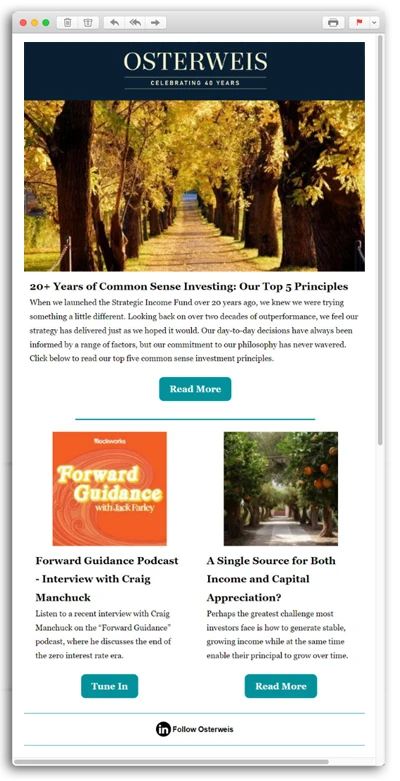Transcript
|
Nael Fakhry: We think it's a company that has really three characteristics. The first is it's a business with a durable competitive advantage. Typically, these companies operate in industries with attractive industry structures. It's an oligopoly, a duopoly, maybe even a monopoly, in the extreme. And these companies have financial attributes like attractive returns on invested capital that are improving, actually going up. They have pricing power, pricing in excess of cost inflation, attractive margins. They tend not to require too much external capital to grow and they don't require a lot of financial leverage and the output of it all is that they generate a lot of free cash flow and growing free cash flow. That's the North Star, that's what we're looking for and we think that's the ultimate reflection of a company with a durable competitive advantage. So that's the first leg of the stool. The second leg is just a company that generates revenue growth at or above the rate of GDP growth in the U.S. And third, we want companies that have good governance, that ideally they also have really good management, but the governance is really important because that ensures that even if the management changes, the stewardship of the business will be there over time. |
|
Nael Fakhry: I'd say the way we think about it is really twofold. So first we look at the proxy of every company and we think about the incentives for management, and then we look at the board and how it's constructed. And so in terms of management, we're looking at incentives, primarily their short-term incentives and then their annual bonuses basically, and then their long-term incentives. And when we see companies that have incentives around returns on invested capital, free cash flow, that kind of thing is we think, or even relative shareholder returns, those kinds of combinations we think are really positive and indicate that the company is interested in driving shareholder value. Things like earnings per share in margins can also be attractive. What we don't like is when we see a company where the incentives are all around revenue growth, for example, and there's no governor about how you drive that revenue growth, because anyone can drive revenue growth and that can actually lead to really dangerous outcomes, maybe good outcomes in the short term, but dangerous outcomes in the long term. So the incentives is one, that's one element that we look at. And I'd say the other one we look at, like I said, is board construction. We're looking for companies that have real boards where there's the board composition is ideally you have an independent Director, a Chair, you don't have a staggered board or annual elections, the board gets refreshed. So that kind of thing is important. And the last thing I would say is it's a little more squishy I'd say, is basically just other considerations like leverage and does this company have a ton of leverage and always running with max leverage at all times? That makes us nervous. Companies that tend to have stable historical capital allocation tend to have stable capital allocation going forward. It's not always the case, but it often is the case. So that kind of constellation of factors is what we consider. |
The Osterweis Funds are available by prospectus only. The Funds' investment objectives, risks, charges, and expenses must be considered carefully before investing. The summary and statutory prospectuses contain this and other important information about the Funds. You may obtain a summary or statutory prospectus by calling toll free at (866) 236-0050, or by visiting www.osterweis.com/statpro. Please read the prospectus carefully before investing to ensure the Fund is appropriate for your goals and risk tolerance.
Mutual fund investing involves risk. Principal loss is possible.
Osterweis Capital Management is the adviser to the Osterweis Funds, which are distributed by Quasar Distributors, LLC. [OCMI-633263-2024-10-30]
